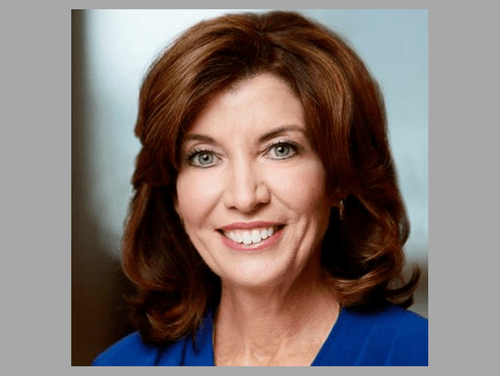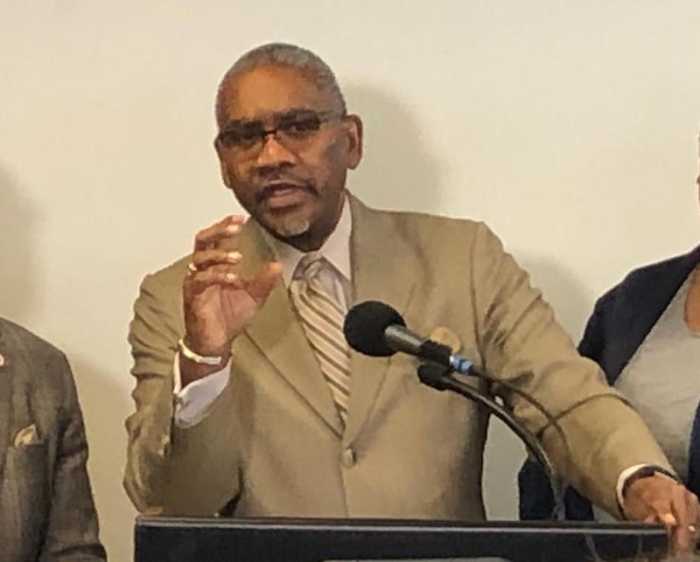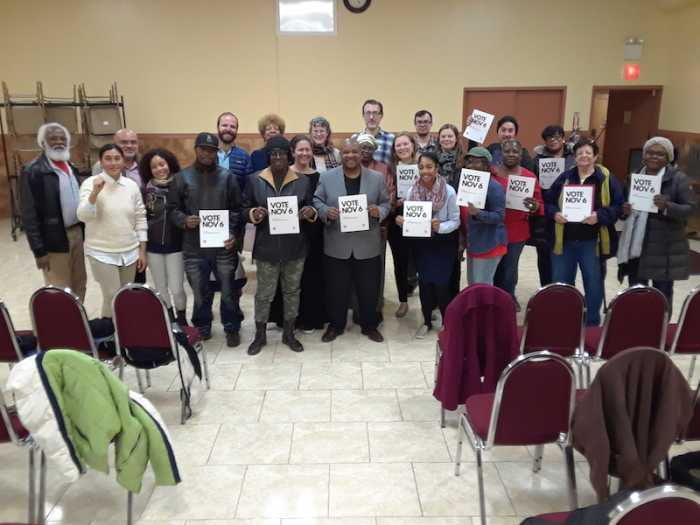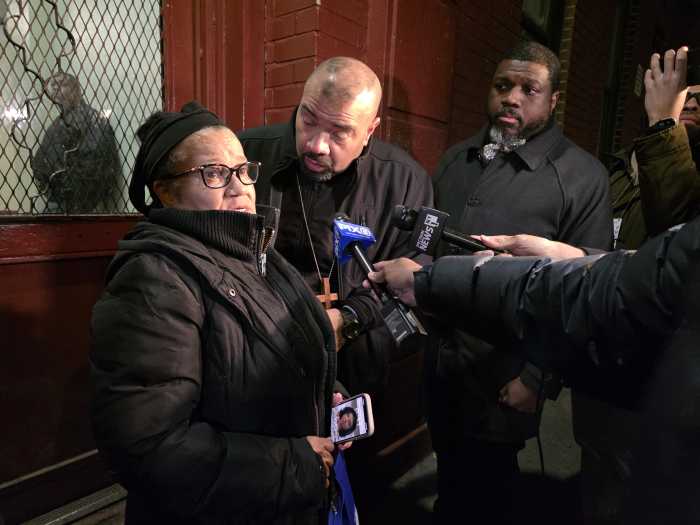Editor’s Note: Although this Kings County Politics interview took place during the 2018 election season it provides some insights into Lt. Gov. Kathy Hochul, who will become the next governor should Gov. Andrew Cuomo resign.
Incumbent Lieutenant Governor Kathy Hochul, who is seeking re-election as part of a ticket with Gov. Andrew Cuomo, grew up in Buffalo, has been in public service for 25 years.
Prior to getting elected as lt. governor in 2015, Hochul served one term (2011-2013) in the House representing New York’s 26th congressional district as the first Democrat to hold the seat in 40 years.
Hochul became politically active during her college years at Syracuse University, and went on to receive her law degree from the Columbus School of Law at Catholic University in Washington, D.C.
While Hochul is running on the ticket with Cuomo, she must first get past her primary opponent, City Council Member Jumaane Williams (D-Brooklyn).
The following interview took place yesterday at the Vineapple Cafe, 71 Pineapple Street in Brooklyn Heights. In person, Hochul is direct and personable. Some of the interview was condensed and edited for length.
Kings County Politics: What do you see as the role of lieutenant governor in New York?
Kathy Hochul: Constitutionally I’m president of the [state] senate and I fill in for the governor when the governor is not able to perform duties.
The way I define the role is to be very much an activist leader. Someone who visits and engages every corner of this state, to talk about Governor Cuomo’s and my agenda. To improve the lives of New Yorkers, and it takes me to every corner of the state from the shores of Long Island to the mountains of the north country to the lakes of upstate New York.
Specifically, I champion a number of signature initiatives. One is I co-chair the heroin and opioid task force, and I convene sessions all 0ver the state to gather information and formulate policies. I chair the regional economic development councils. Being responsible for economic development and that has brought me to Brooklyn countless times for many ribbon cuttings and ground breakings. and touring Tech businesses. The Brooklyn Navy Yard, I’ve spent a lot of time there, and a lot of time in Central Brooklyn, working out the challenges they face. The Vital Brooklyn initiative, the $1,4 billion that includes for better health care and more access to affordable housing, and to really dig deep into these problems. So I think part of my role is to identify these problems and find concrete solutions, and then activate them.
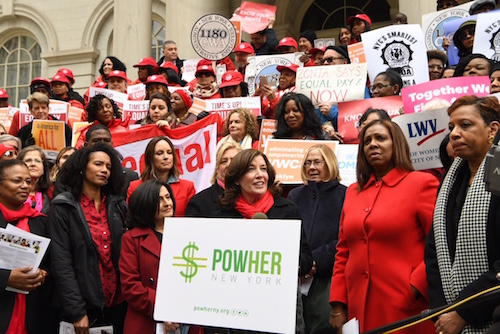
I also champion women in a statewide capacity. I feel that’s my responsibility to be the voice on women’s equality and family paid leave, whether it’s minimum wage increases because the majority of minimum wage earners are women, eradicating discrimination in the workplace, or sexual harassment on college campuses. That was another signature initiative I worked on. I’ve also used my position as a platform to engage women who are considering running for office and pave the way for them.
Speaking of women’s issues, yesterday Brooklyn Assemblywoman Jo Anne Simon saw her gender neutral legislation pass the assembly. The measure will change the wording in all government statutes from the terms policeman and fireman to the terms police officer and firefighter. How important do you think legislation like this or do you think it was more of a symbolic gesture?
It makes a difference. When you’re trying to change cultures, it doesn’t happen with one signature legislation. There are many facets and that is one element. These are male dominated fields that are male dominated because they have the word men in it. It’s a signal that firemen are men and policemen are men so when you’re a young girl trying to think about careers that might be a barrier.. You don’t know that. So why not rename that?
But we have a lot to do to change culture. Men have a responsibility in the work place as well to not just say yes when they are privy to the comments and jokes being made. Making comments about women’s attire. Men can shut that down and they should be doing that. And also the fact that they now know they will be exposed and maybe land in the newspaper or be publicly ostracized. They can lose their job. They can lose their family. They can lose their friends because of behavior that they think is a right of theres because they are a man. That era is over and that is tremendous progress and I feel that the MeToo movement has given us the opportunity to do that. And also the governor and I have talked about that all over the state.
You ask what have I done as lieutenant governor and most people don’t know that I have defined the role and recreated the position to one that is activist and championing causes and people from communities that have needed a voice. Whether it’s women or whether its people in poverty or recently incarcerated individuals. Recently I launched the governor’s initiative to get businesses to pledge to hire people who have been incarcerated. I’ve gone to reentry programs, retraining for these men who have been in these positions to reduce the recidivism rate and give them more opportunities. This is how I chose to define the job. It’s incredibly expansive it’s all-consuming. It much more time than probably my predecessors spent on it. That’s how I do every job I’ve ever had.

Your Democratic primary opponent is running on a platform that his role as lieutenant governor in part is to keep the governor in check. On a strictly governing level, how important do you think it is that the lt. governor and the governor get along?
I think it’s very important. I don’t think you want a situation where there’s conflict from within. There’s enough conflict on the outside. There are natural checks and balances. You have had a Republican senate. They are a counterbalance to the governor and have that. There are certainly other counter balances. But imagine a scenario where President Obama in president and Joe Biden [former vice president under Obama] is criticizing the president every day and undermining him. That is not healthy for either the party nor for the governor. So I view it as a partnership with diversity.
Have you ever disagreed with the governor?
I can disagree all I want, but the public doesn’t need to know about it.
But have you ever?
I’ve told him my points of view and we’ve worked through it. I have no problem with that. I have a reputation of being fiercely independent, which surprised some people when he asked me to be his running mate, because that is my reputation and has been since my early days of 25 years in public life. Despite that reputation the governor was not afraid of that. He asked me to be his running mate and it’s been a very successful partnership.
Is there anything in the last four years that you would have liked to accomplish that you didn’t get done?
Yes, but that’s what the next four years is about. We’ve had a very, very aggressive progressive agenda we can all be proud of, but we want to get other initiatives done. I’d like to see more done in respect to campaign finance reform. I’d like to see early voting, open up the ballot box to more people. It shouldn’t only be one day in November when people can cast their right to vote. Our state has an abysmal record in respect to voter participation. We are the lowest in the nation. It’s hard because its only one day in November and you have working moms that have to be up early in the morning, get their kids off to school and work all day. They’re tired at the end of the day, helping out with homework, whatever and maybe they don’t have the time to vote on that day in spite of their intention to do so. Let’s open it up. Lets make it easier for people.
I think we can do more to get money out of politics. I’ve been championing campaign finance reform and public financing [of elections] since my days as a staffer for [former U.S.] Sen. Patrick Moynihan. I wrote legislation that made it to the floor of the U.S. Senate. It was filibustered by the Republicans. So that’s something I want to be focussing on with the governor in the next four years.
It seems to me that a lot of the Democratic primary for both governor and lieutenant governor is a race to the left. There’s a lot of talk, for example, about criminal justice reform and helping the underrepresented and yet New York is one of the highest tax states. There’s the feeling the middle class is being squeezed. The people who play by the rules. Property taxes are going up across the state. These people are getting taxed left and right. What’s your sense on keeping the middle class in this state strong?
I understand the question but I dispute the calculations because taxes have gone down. There is a freeze on taxes and the taxes are not going up. The governor inherited a state that has a well deserved reputation as being a tax and spend state. Taxes are too high and that’s why a lot of businesses fled our state when I was growing up. I’m from Buffalo. I know what it’s like when people say the last one out turn off the lights. People fled the area, including all my siblings. I’m from an Irish Catholic family and there’s nobody left but me. So he [Cuomo] came in and worked with the Republicans because they were the majority, and he found ways to cut taxes, and that has been profound, keeping the cost of property taxes down.
We’ve also cut corporate taxes lower and manufacturing rates lower. All these are lower than you ever seen in your life, but people just don’t know it That’s part of the problem. So the taxes are lower. The cost of state government is less. It used to be under Rockefeller that it [the budget] went up around 10 percent a year, and under Mario {Cuomo] about 6 percent, Pataki about 5 percent. This governor has kept the cost of state government from growing at 2 percent or less every year.
As a Irish-American woman from Buffalo, do you see yourself more as a old-school blue-collar Democrat and opposed to a progressive Democrat?
I don’t see the difference. I have blue-collar roots, but my parents were protesting the Vietnam War when I was a little kid. I had a black arm band on when I went to grade school and I think that’s pretty progressive….
And I was protesting for civil rights as a kid. So you can have an activist heart and be progressive, and still have your family be blue-collar. So I’m not about being pigeonholed.
But there is that argument that part of the reason there is a Donald Trump as president is because the Democrats used to have a large blue-collar base, which shifted to identity politics and this progressive base. That the blue-collar Dems are moving to Republican because they feel the Democratic Party has abandoned them and have moved away from representing their interests.
And we have to speak to them. And that’s what my job is because I came out of that world. But I reject the idea that you can’t do that as well as have a progressive heart and progressive values and progressive e actions because I have all that. But I think you need people like myself who can straddle both worlds. That’s what I do as the lieutenant governor. I’m just as comfortable walking into a diner in a very rural area and sitting down and talking with people about healthcare and Medicare.
As a Congressowman, I represented the most Republican district in the state of New York as a Democrat. Those are the issues that I captured that sentiment, talking about social security and Medicaid and healthcare . There are common issues that they care about. And we just have to persuade them that we have their backs So if you come back to us we’ll fight for you.
And on the [progressive side, the governor and I have the most progressive agenda in America today. And it’s not just ideals and saying, ‘Oh, were going to do this some day in the year 2050.’ We’re saying we get it done now so we’re both very pragmatic. We can promise the world. I can say everyone in Brooklyn will be a millionaire by the year 2050. Who’s going to be around to check?
I think it’s important to have realistic goals and also accomplishments that you can run on. That’s why I feel the governor and I are successful, because we want to enlighten people to what we’ve done for them already, but also how we’re going to protect them and fight for them in the next term of office.


